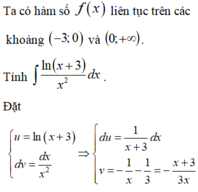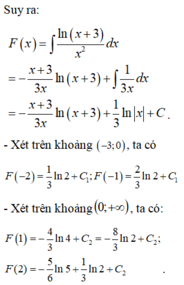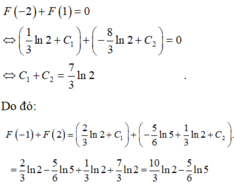Hãy nhập câu hỏi của bạn vào đây, nếu là tài khoản VIP, bạn sẽ được ưu tiên trả lời.

Để kiểm tra một hàm F(x) có phải là một nguyên hàm của f(x) không thì ta chỉ cần kiểm tra F'(x) có bằng f(x) không?
a) \(F\left(x\right)\) là hằng số nên \(F'\left(x\right)=0\ne f\left(x\right)\)
b) \(G'\left(x\right)=2.\dfrac{1}{2}.\dfrac{1}{\cos^2x}=1+\tan^2x\)
c) \(H'\left(x\right)=\dfrac{\cos x}{1+\sin x}\)
d) \(K'\left(x\right)=-2.\dfrac{-\left(\dfrac{1}{2}.\dfrac{1}{\cos^2\dfrac{x}{2}}\right)}{\left(1+\tan\dfrac{x}{2}\right)^2}=\dfrac{\dfrac{1}{\cos^2\dfrac{x}{2}}}{\left(\dfrac{\cos\dfrac{x}{2}+\sin\dfrac{x}{2}}{\cos\dfrac{x}{2}}\right)^2}\)
\(=\dfrac{1}{\left(\cos\dfrac{x}{2}+\sin\dfrac{x}{2}\right)^2}=\dfrac{1}{1+2\cos\dfrac{x}{2}\sin\dfrac{x}{2}}\)
\(=\dfrac{1}{1+\sin x}\)
Vậy hàm số K(x) là một nguyên hàm của f(x).

Làm xuôi thì đơn giản, tính \(F'\left(x\right)\) là xong (chịu khó biến đổi)
Làm ngược thì nhìn biểu thức hơi thiếu thân thiện
\(\int\dfrac{2\sqrt{2}\left(x^2-1\right)}{x^4+1}dx=\int\dfrac{2\sqrt{2}\left(x^2-1\right)}{\left(x^2-x\sqrt{2}+1\right)\left(x^2+x\sqrt{2}+1\right)}dx\)
Phân tách hệ số bất định:
\(\dfrac{2\sqrt{2}\left(x^2-1\right)}{\left(x^2-x\sqrt{2}+1\right)\left(x^2+x\sqrt{2}+1\right)}=\dfrac{a\left(2x-\sqrt{2}\right)}{x^2-x\sqrt{2}+1}+\dfrac{b\left(2x+\sqrt{2}\right)}{x^2+x\sqrt{2}+1}\)
Quan tâm tử số: \(a\left(2x-\sqrt{2}\right)\left(x^2+x\sqrt{2}+1\right)+b\left(2x+\sqrt{2}\right)\left(x^2-x\sqrt{2}+1\right)\)
\(=2\left(a+b\right)x^3+\sqrt{2}\left(a-b\right)x^2+\sqrt{2}\left(b-a\right)\)
Đồng nhất 2 tử số: \(\left\{{}\begin{matrix}a+b=0\\a-b=2\\\end{matrix}\right.\) \(\Rightarrow\left\{{}\begin{matrix}a=1\\b=-1\end{matrix}\right.\)
Do đó:
\(\dfrac{2\sqrt{2}\left(x^2-1\right)}{x^4+1}=\dfrac{2x-\sqrt{2}}{x^2-x\sqrt{2}+1}-\dfrac{2x+\sqrt{2}}{x^2+x\sqrt{2}+1}\)
Cái tìm hệ số bất định ấy ạ, tại sao lại tách về 2x- căn 2 vậy anh?

`a)TXĐ:R\\{1;1/3}`
`y'=[-4(6x-4)]/[(3x^2-4x+1)^5]`
`b)TXĐ:R`
`y'=2x. 3^[x^2-1] ln 3-e^[-x+1]`
`c)TXĐ: (4;+oo)`
`y'=[2x-4]/[x^2-4x]+2/[(2x-1).ln 3]`
`d)TXĐ:(0;+oo)`
`y'=ln x+2/[(x+1)^2].2^[[x-1]/[x+1]].ln 2`
`e)TXĐ:(-oo;-1)uu(1;+oo)`
`y'=-7x^[-8]-[2x]/[x^2-1]`
Lời giải:
a.
$y'=-4(3x^2-4x+1)^{-5}(3x^2-4x+1)'$
$=-4(3x^2-4x+1)^{-5}(6x-4)$
$=-8(3x-2)(3x^2-4x+1)^{-5}$
b.
$y'=(3^{x^2-1})'+(e^{-x+1})'$
$=(x^2-1)'3^{x^2-1}\ln 3 + (-x+1)'e^{-x+1}$
$=2x.3^{x^2-1}.\ln 3 -e^{-x+1}$
c.
$y'=\frac{(x^2-4x)'}{x^2-4x}+\frac{(2x-1)'}{(2x-1)\ln 3}$
$=\frac{2x-4}{x^2-4x}+\frac{2}{(2x-1)\ln 3}$
d.
\(y'=(x\ln x)'+(2^{\frac{x-1}{x+1}})'=x(\ln x)'+x'\ln x+(\frac{x-1}{x+1})'.2^{\frac{x-1}{x+1}}\ln 2\)
\(=x.\frac{1}{x}+\ln x+\frac{2}{(x+1)^2}.2^{\frac{x-1}{x+1}}\ln 2\\ =1+\ln x+\frac{2^{\frac{2x}{x+1}}\ln 2}{(x+1)^2}\)
e.
\(y'=-7x^{-8}-\frac{(x^2-1)'}{x^2-1}=-7x^{-8}-\frac{2x}{x^2-1}\)

\(f\left(x\right)=\dfrac{x^2-1}{x^2}=1-\dfrac{1}{x^2}\)
\(\int f\left(x\right)dx=\int\left(1-\dfrac{1}{x^2}\right)dx=\int1dx-\int x^{-2}dx\)
=\(x-\dfrac{x^{-2+1}}{-2+1}+C=x-\dfrac{x^{-1}}{-1}+C=x+\dfrac{1}{x}+C\)
C=-1 ta được phương án A(ko tm câu hỏi)
C=0 ta được phương án B(ko tm câu hỏi)
C=2 ta được phương án C(ko tm câu hỏi)
=>chọn D

1.
\(y'=\left(\dfrac{x}{lnx}\right)'.3^{\dfrac{x}{lnx}}.ln3=\dfrac{lnx-1}{ln^2x}.3^{\dfrac{x}{lnx}}.ln3\)
2.
\(y'=\left(tanx\right)'.tanx+\left(tanx\right)'.\dfrac{1}{tanx}=\dfrac{tanx}{cos^2x}+\dfrac{1}{tanx.cos^2x}\)
3.
\(y=\left(ln2x\right)^{\dfrac{2}{3}}\Rightarrow y'=\left(ln2x\right)'.\dfrac{2}{3}.\left(ln2x\right)^{-\dfrac{1}{3}}=\dfrac{1}{3x\sqrt[3]{ln2x}}\)

Lời giải:
Đặt \(u=\ln (x+\sqrt{x^2+1}); dv=\frac{1}{\sqrt{x^2+1}}dx\)
\(\Rightarrow du=\frac{dx}{\sqrt{x^2+1}}; v=\int \frac{x}{\sqrt{x^2+1}}dx=\frac{1}{2}\int \frac{d(x^2+1)}{\sqrt{x^2+1}}=\sqrt{x^2+1}\)
\(\Rightarrow \int \frac{x\ln (x+\sqrt{x^2+1})}{\sqrt{x^2+1}}dx=\int udv=uv-vdu=\sqrt{x^2+1}\ln (x+\sqrt{x^2+1})-\int dx\)
\(=\sqrt{x^2+1}\ln (x+\sqrt{x^2+1})-x+C\)

`a)TXĐ: R`
`b)TXĐ: R\\{0}`
`c)TXĐ: R\\{1}`
`d)TXĐ: (-oo;-1)uu(1;+oo)`
`e)TXĐ: (-oo;-1/2)uu(1/2;+oo)`
`f)TXĐ: (-oo;-\sqrt{2})uu(\sqrt{2};+oo)`
`h)TXĐ: (-oo;0) uu(2;+oo)`
`k)TXĐ: R\\{1/2}`
`l)ĐK: {(x^2-1 > 0),(x-2 > 0),(x-1 ne 0):}`
`<=>{([(x > 1),(x < -1):}),(x > 2),(x ne 1):}`
`<=>x > 2`
`=>TXĐ: (2;+oo)`
câu l) $x^2-1 > 0$ thì giải ra 2 nghiệm $x < -1, x > 1$ mới đúng chứ nhỉ?






Chọn A